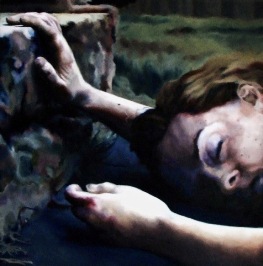
With her last breath, the Levite’s concubine reaches out for safety
A concubine rebels
The story starts with a blunt statement: at this particular time, Israel had no king. It was a lawless time where anything could happen.
A man from the tribe of Levi had married a woman – well, not quite. She was a concubine, a sort of second-status wife, not quite a wife by not free either.
Perhaps it had something to do with her dowry, or lack of it. She had all the tasks of a wife, but none of the status, like a live-in girlfriend who did not have the right to break off the relationship.
She leaves her husband & goes home
But this woman did break it off, so to speak, by leaving her husband and returning to her father’s house.
The reason for her departure is not given. She was angry with her husband and simply upped stakes and left.
This, you might think, would make her a free woman. It did not. According to the laws of the time, she was now an adulteress.

The unhappy concubine
She lived in her father’s house for four months. At the end of this time her husband followed her to try to get her back – which suggests that she was the offended party.
We are told that he ‘spoke tenderly to her’, but we are not told what her response was.
Two lonely men
There was no doubt about her father’s response: he welcomed the husband back with open arms. The two men ate and drank and talked for several days. There was, ominously, no mention of the woman.
When the husband prepared to leave, the woman’s father urged him to stay. And stay.
The men talked and laughed and enjoyed eath other’s company for nearly a week. The father was so pressing in his repeated invitations that it looks as if these were two rather lonely, isolated men who longed for fellowship with each other rather than marriage and a family with a woman.
But what about the woman?
The Levite seemed to be ignoring his wife, and perhaps the Bible is giving us a clue as to why she left him in the first place.
Eventually the two men made their farewells and the husband set out with ‘his two saddled donkeys and his concubine’.
Notice that the Bible alerts the reader to the politics of this group: it mentions the donkeys before the woman….

Map of Jebus and Gibeah; Jebus would later become the city of Jerusalem
An ominous beginning
There was quite a distance to be covered on this journey, more than they could manage in one day. They had to look for somewhere to stay the night.
The man’s servant suggested that they spend the night in the hill town of Jebus. The town later became the city of Jerusalem, but at this time it was still a Canaanite city, and the man preferred to stay in an Israelite town. He no doubt felt they would be safer with their own kind, and decided to press on to an Israelite town called Gibeah.
Not a good choice, as it turned out.
They entered the walled settlement and followed the traditional procedure for travellers. They went to the town square and sat themselves down. Under the laws of hospitality, a citizen of the city had to offer them shelter and food for the night.
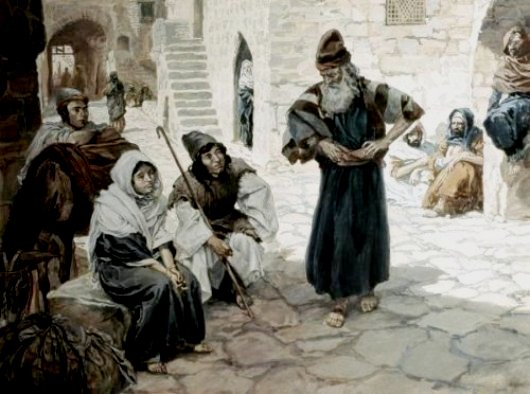
The travellers wait for an offer of hospitality, James Tissot
Nobody offered.
They sat and waited, and waited.
Finally an old man passed through the square, on his way home after a day’s work. He saw their plight, and knew what he should do. As it turned out, he was from the same place – the hill country of Ephraim – as the husband.
He talked to them and offered them a roof for the night – they already had everything else they needed – food for themselves and fodder for the animals.
Traditional hospitality
The weary travellers went with him to his house. They fed the animals, then settled down to eat, drink and talk.
Before long, however, they were interrupted. The ‘men of the city’, whom the Bible rightly describes as ‘perverse’, surrounded the house and started pounding on the door. They demanded that the old man surrender the woman’s husband, so that they could have sex with him.
Such a think of course was completely incompatible with the ancient laws of hospitality, and the story has striking similarities with what happened at Sodom in Genesis 19.
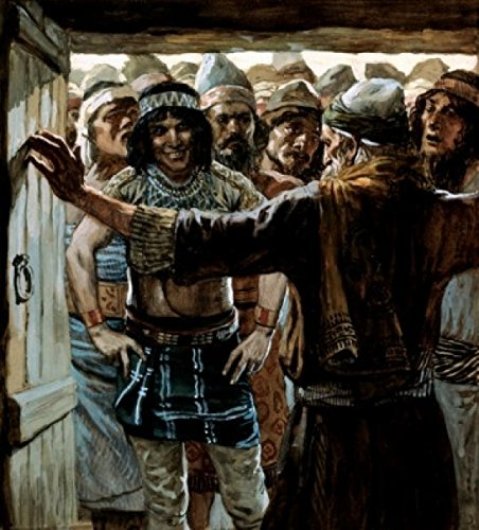
The old man confronts the Ephramites, James Tissot
The old man opened the door and confronted them. He had little alternative, since the violent crowd outside his house would easily break down the door. He begged them not to touch his guest, since the laws of hospitality overruled everything else.
We see how important these laws were when we read the alternative he offered the crowd: he would give them his own daughter, a virgin, and the nameless concubine as well, if they would spare his male guest.
‘Ravish them and do whatever you want to them; but against this man do not do such a vile thing.’
The crowd was in no mood to bargain so, horrifyingly, the young man, the traveller, desperate to save himself, took hold of his concubine and pushed her out the door into the vile crowd of men.
Her fate is too terrible to imagine. The Bible says simply that they wantonly raped and abused her all through the night until the moring. Then they let her go.
Naked evil
She crawled back to the door of the house where she would, she thought, find shelter.
All was silent, and she was unable to make herself heard. When it was light her husband opened the door and looked out, immediately seeing her lying on the doorstep with her hands outstretched towards the threshold.
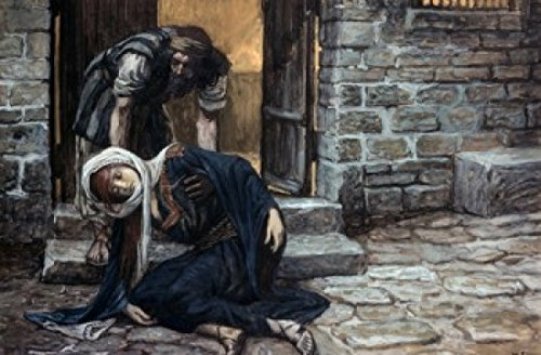
The Levite finds his concubine on the doorstep,
James Tissot
Was she dead or alive? The Bible is not specific on this point.
And what was the husband’s reaction? There was not a hint of anguish or tenderness in his words: ‘Get up. We are going.’ When she did not respond he hoisted her limp body onto his donkey and set out for home.
Twelve pieces for the twelve tribes
What follows it even more horrific than the rape itself.
Once home, he took her body into his house, then he picked up a knife and cut her into twelve separate pieces. He then sent the twelve pieces to the twelve separate tribal territories of Israel, to express his outrage at what had happened.
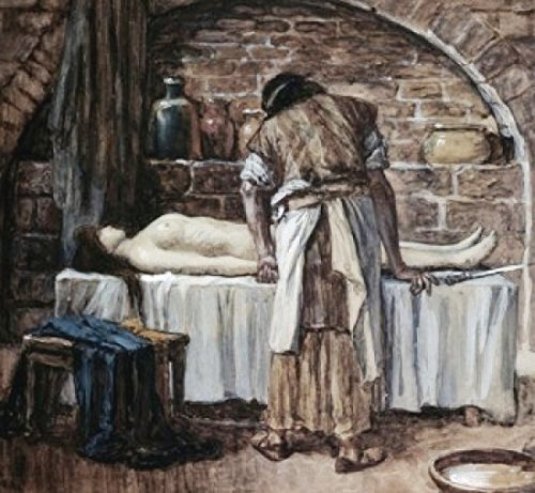
The Levite cuts his wife in twelve pieces, James Tissot
The people are nameless
Not one of the characters in this Bible story is given a name.
- Is it shame about the vile actions of almost everyone in the story?
- Or are the names of the people unimportant, since the story is meant to persuade the Israelites that they need a king to maintain order?
What’s the theme of this story?
The old tribal system that worked quite well during the settlement period in Canaan is losing its hold. The tribes are fragmenting, and traditional law is being ignored – this is the theme of the Book of Judges, in which the story of the Levite’s concubine appears.
Social order and unity are disintegrating – the story of the Levite’s concubine makes this patently obvious. Something must be done.
Notes, extra information
THE BOOK OF JUDGES ends with the story of the war between Benjamin and the other Israelite tribes, following the ravishing of the concubine of a Levite at the hands of the people of Gibeah in Benjamin.
This story reflects the general situation during the period of the Judges: “In those days there was no king in Israel: every man did what was right in his own eyes”.
Although there was no central political rule in Israel in this period, there was evidently a confederation of tribes formed around a central sanctuary. If one tribe violated the laws of the league, the council would meet to confer punishment.
The historical circumstances of the Israelite war against Benjamin remain obscure. It may have occurred at an earlier period or at the end of the period of the Judges. Benjamin was a strong well-established tribe, and Gibeah in Benjamin became the first capital of Israel, under Saul.
Paintings: the Levite’s concubine
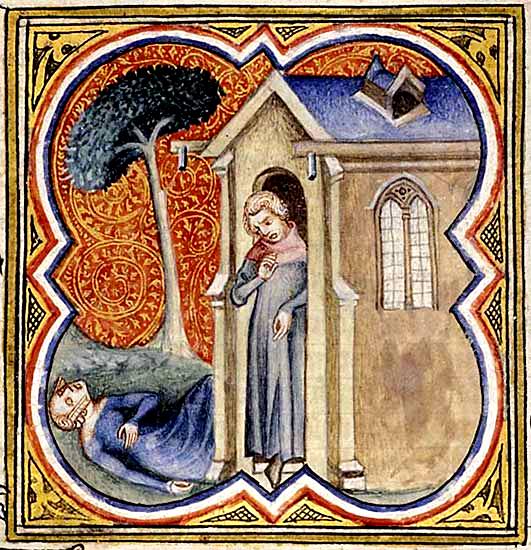
The Levite finds the concubine on the steps of the house, medieval manuscript
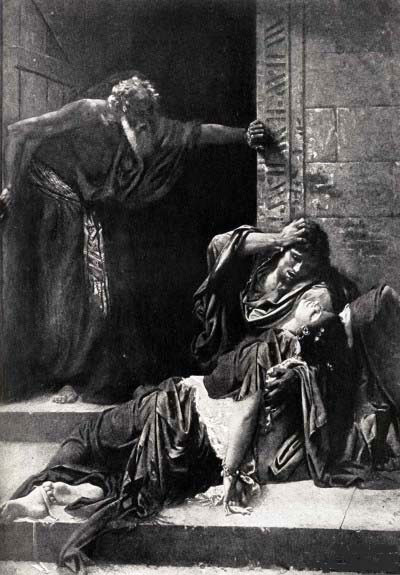
The men find the body of the concubine on the doorstep, 19th century book illustration
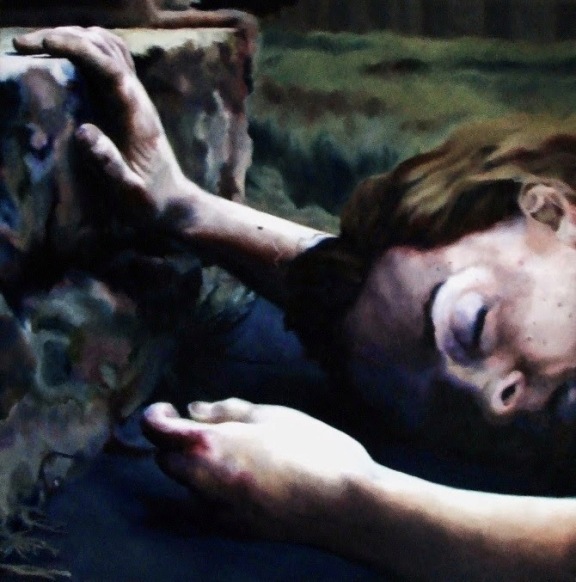
The Levite’s concubine, modern posed photograph
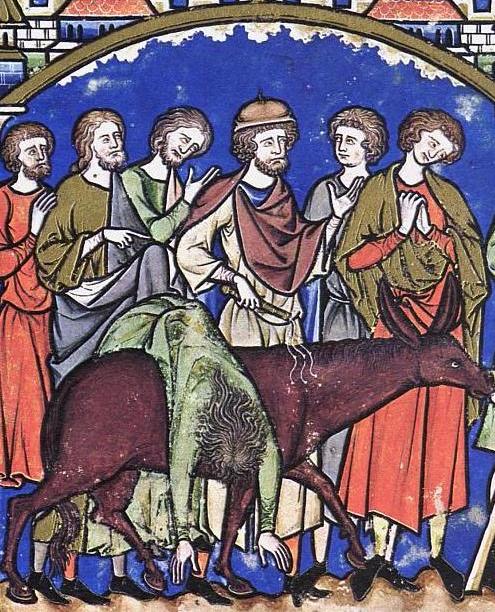
The Levite carries his concubine home,
medieval manuscript
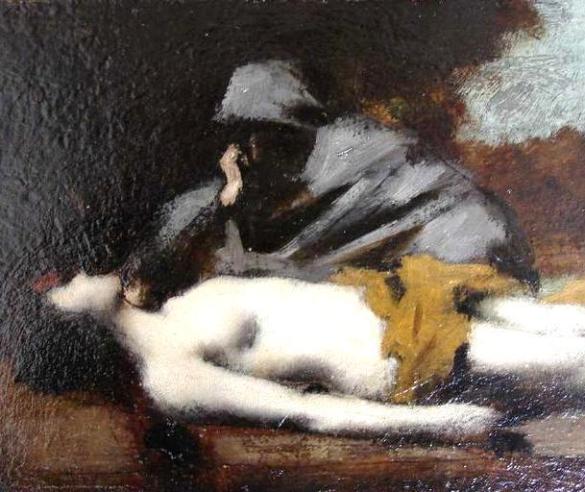
The Levite and the dead concubine, Jean Jacques Henner
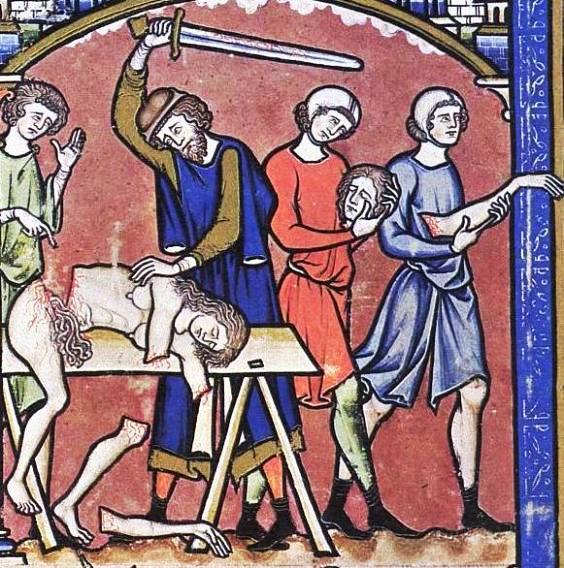
The Levite divides his concubine’s body into twelve pieces, medieval manuscript
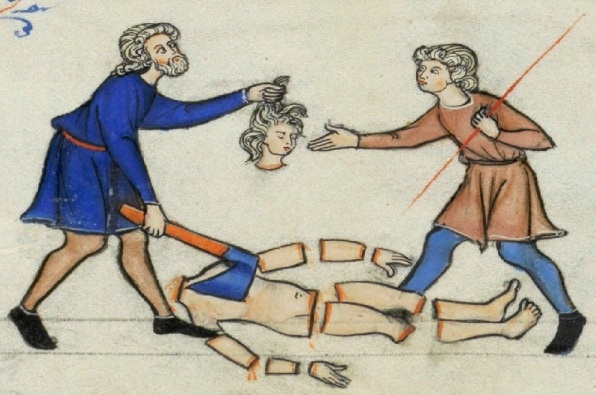
The concubine dismembered, medieval manuscript
Bible text for the Levite & Concubine
Judges 19

Vietnam photograph. The woman has been raped and murdered. The men smile and pose for the photographer.
19:1 In those days Israel had no king. Now a Levite who lived in a remote area in the hill country of Ephraim took a concubine from Bethlehem in Judah.
2 But she was unfaithful to him. She left him and went back to her parents’ home in Bethlehem, Judah. After she had been there four months,
3 her husband went to her to persuade her to return. He had with him his servant and two donkeys. She took him into her parents’ home, and when her father saw him, he gladly welcomed him.
4 His father-in-law, the woman’s father, prevailed on him to stay; so he remained with him three days, eating and drinking, and sleeping there.
5 On the fourth day they got up early and he prepared to leave, but the woman’s father said to his son-in-law, “Refresh yourself with something to eat; then you can go.”
6 So the two of them sat down to eat and drink together. Afterward the woman’s father said, “Please stay tonight and enjoy yourself.”
7 And when the man got up to go, his father-in-law persuaded him, so he stayed there that night. 8 On the morning of the fifth day, when he rose to go, the woman’s father said, “Refresh yourself. Wait till afternoon!” So the two of them ate together.
9 Then when the man, with his concubine and his servant, got up to leave, his father-in-law, the woman’s father, said, “Now look, it’s almost evening. Spend the night here; the day is nearly over. Stay and enjoy yourself. Early tomorrow morning you can get up and be on your way home.”
10 But, unwilling to stay another night, the man left and went toward Jebus (that is, Jerusalem), with his two saddled donkeys and his concubine.
11 When they were near Jebus and the day was almost gone, the servant said to his master, “Come, let’s stop at this city of the Jebusites and spend the night.”
12 His master replied, “No. We won’t go into any city whose people are not Israelites. We will go on to Gibeah.”
13 He added, “Come, let’s try to reach Gibeah or Ramah and spend the night in one of those places.”
14 So they went on, and the sun set as they neared Gibeah in Benjamin.
15 There they stopped to spend the night. They went and sat in the city square, but no one took them in for the night.
16 That evening an old man from the hill country of Ephraim, who was living in Gibeah (the inhabitants of the place were Benjamites), came in from his work in the fields.
17 When he looked and saw the traveler in the city square, the old man asked, “Where are you going? Where did you come from?”
18 He answered, “We are on our way from Bethlehem in Judah to a remote area in the hill country of Ephraim where I live. I have been to Bethlehem in Judah and now I am going to the house of the Lord.[a] No one has taken me in for the night.
19 We have both straw and fodder for our donkeys and bread and wine for ourselves your servants—me, the woman and the young man with us. We don’t need anything.”
20 “You are welcome at my house,” the old man said. “Let me supply whatever you need. Only don’t spend the night in the square.”
21 So he took him into his house and fed his donkeys. After they had washed their feet, they had something to eat and drink.
22 While they were enjoying themselves, some of the wicked men of the city surrounded the house. Pounding on the door, they shouted to the old man who owned the house, “Bring out the man who came to your house so we can have sex with him.”
23 The owner of the house went outside and said to them, “No, my friends, don’t be so vile. Since this man is my guest, don’t do this outrageous thing.
24 Look, here is my virgin daughter, and his concubine. I will bring them out to you now. Ravish them and do whatever you want to them; but against this man do not do such a vile thing.”
25 But the men would not listen to him. So the man took his concubine and sent her outside to them, and they raped her and abused her throughout the night, and at dawn they let her go.
26 At daybreak the woman went back to the house where her master was staying, fell down at the door and lay there until daylight.
27 When her master got up in the morning and opened the door of the house and stepped out to continue on his way, there lay his concubine, fallen in the doorway of the house, with her hands on the threshold.
28 He said to her, “Get up; let’s go.” But there was no answer. Then the man put her on his donkey and set out for home.
29 When he reached home, he took a knife and cut up his concubine, limb by limb, into twelve parts and sent them into all the areas of Israel.
30 Everyone who saw it was saying to one another, “Such a thing has never been seen or done, not since the day the Israelites came up out of Egypt. Just imagine! We must do something! So speak up!”
Levite’s concubine – links

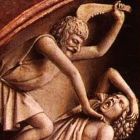


© Copyright 2006
Elizabeth Fletcher


